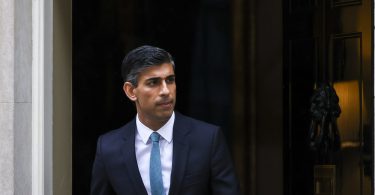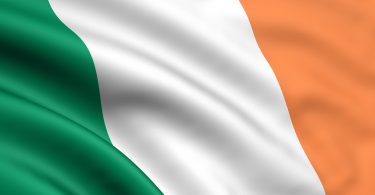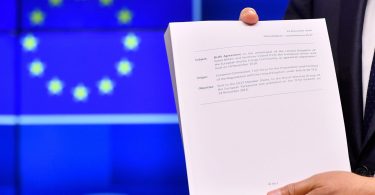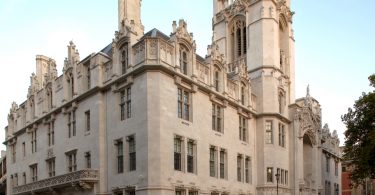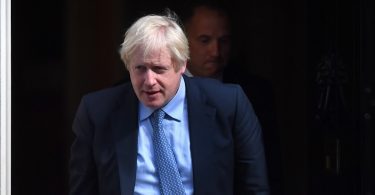Martin Howe QC, Chairman of Lawyers for Britain, continues his series of briefings and dissections of the Withdrawal Agreement with this assessment of the way in which the Northern Ireland Protocol (which is part of the Agreement) would affect Northern Ireland differently from Great Britain and would affect Northern Ireland’s constitutional status within the United Kingdom. The Attorney-General’s advice to the Cabinet which was revealed to Parliament on 5 December 2018 makes clear how much Northern Ireland and its people would be treated differently from people in Great Britain.
- While the Protocol requires the whole of the UK to stay inside a customs union, Northern Ireland will also have to apply all the rules of the single market relating to the placing of goods on the market and the processes and procedures they must undergo before being placed on the market, and rules relating to movement of goods (such as rules on live animal exports), but also includes connected matters such as EU legislation on intellectual property.
- The Protocol will oblige the UK to prevent the importation into Northern Ireland of goods from Great Britain that do not comply with EU law, although not vice versa. This will entail a requirement to operate checks on goods which cross the Irish Sea from East to West.
- Barriers between GB and Northern Ireland would be damaging for Northern Ireland as its trade with Great Britain is two and a half times bigger than its trade with the Republic of Ireland.
- Creating barriers within the UK is would be contrary to Article VI of the 1800 Articles of Union. The UK internal market is also recognised in the legislation which established the current Northern Ireland Assembly, the Northern Ireland Act 1998.
What is the “backstop” and why does it matter?
In 2017, the European Union insisted on “phasing” the Brexit negotiations and tackling three subjects of interest to the EU first, before the EU would be willing to discuss its long term post-Brexit trading relationship with the UK. Those subjects were, first, the post-Brexit status of EU citizens in the UK and of EU citizens in the EU; secondly, the payment of large sums of severance money by the UK to the EU; and thirdly how the land border between Northern Ireland and the Republic would operate after the UK’s exit from the EU.
In what seemed at the time an act of folly, and in hindsight can be seen to have been an act of sheer self-harming idiocy, the UK government succumbed to this “phasing”, so submitting itself to jumping through a series of hoops at each of which the EU could use the ticking clock to extract yet more concessions. It emerged from David Davis’s resignation letter that he had opposed agreeing to the EU’s negotiating timetable but was over-ruled by the Prime Minister.
Agreeing to discuss Irish border arrangements in advance of and in isolation from the framework of the UK’s post-Brexit trade relationship with the EU was also an absurdity. It is obvious that how the border will operate post-Brexit is intimately bound up with the nature of that trade relationship.
By late 2017, the Prime Minister had manoeuvered herself and the UK into a position of humiliating weakness and had made a series of damaging concessions in order to move forward to the next stage of the negotiations. On citizens’ rights, she agreed to giving the courts the power to overturn Acts of Parliament for the whole lifetimes of EU citizens resident in the UK, and agreed to the scope of those citizens’ rights being “interpreted” by the ECJ on direct references from UK courts for many years after we have left the EU. On the EU’s financial claims, she agreed to the UK taxpayer paying what was estimated as £39bn — now revised upwards to nearer £45bn — which the UK simply does not owe under international law. (See our fuller article on the Phase 1 Agreement)
But is was on the Northern Ireland border that she made what has turned out to be the most damaging concession. In her panic to get an agreement – any agreement — to kick the can down the road and get through to the next phase of negotiations, she agreed to the so-called Northern Ireland “backstop” arrangement. It should be emphasised that that agreement in December 2017 was not legally binding, but was a political agreement in principle which was recorded in a document called a “Joint Report” from the EU and UK negotiating teams.
In its form as adopted in the Joint Report, after strenuous objections by the Democratic Unionist Party to an even worse earlier text, the so-called “backstop” reads as follows:-
“49. The United Kingdom remains committed to protecting North-South cooperation and to its guarantee of avoiding a hard border. Any future arrangements must be compatible with these overarching requirements. The United Kingdom’s intention is to achieve these objectives through the overall EU-UK relationship. Should this not be possible, the United Kingdom will propose specific solutions to address the unique circumstances of the island of Ireland. In the absence of agreed solutions, the United Kingdom will maintain full alignment with those rules of the Internal Market and the Customs Union which, now or in the future, support North-South cooperation, the all-island economy and the protection of the 1998 Agreement.
50. In the absence of agreed solutions, as set out in the previous paragraph, the United Kingdom will ensure that no new regulatory barriers develop between Northern Ireland and the rest of the United Kingdom, unless, consistent with the 1998 Agreement, the Northern Ireland Executive and Assembly agree that distinct arrangements are appropriate for Northern Ireland. In all circumstances, the United Kingdom will continue to ensure the same unfettered access for Northern Ireland’s businesses to the whole of the United Kingdom internal market.”
The parts of these paragraphs which amount to the so-called “backstop” are the last sentence of paragraph 49 and the whole of paragraph 50, each of which begin with the words “in the absence of agreed solutions …” In other words, this amounts to a commitment by the UK (although not a legally binding one) to act in a particular way (“maintain full alignment etc”) if no agreement is reached on the UK’s future trade relationship with the EU.
There are a number of ambiguities in the language of this “backstop”. First, as regards the scope of the rules of the Internal Market and the Customs Union which support the all-island economy etc, and secondly about whether the commitment to “alignment” relates to the whole of the United Kingdom or just to the territory of Northern Ireland. It was also claimed at the time in unattributable media briefings from No. 10 that “full alignment” of rules was radically different from “harmonisation” of rules. By using this phrase, it was said that Sir Humphrey Oh-So-Clever-And-Duplicitous had successfully pulled the wool over the eyes of the stupid Irish who had been outfoxed.
It has since become compellingly clear that the Irish were not being so stupid at all, and that the stupidity was all on the British side. Sir Humphrey was either being extremely stupid himself, or more plausibly the target of his duplicity was not the Irish or the EU, but rather members of the British government. As David Davis explained in the Sunday Times on 4 November 2018:
“It was an unwise decision in December to accept the EU’s language on dealing with the Northern Ireland border. I said so back then and I’m still concerned now. Downing Street officials misled ministers at the time. The Democratic Unionist Party is rightly worried about the future of the union and many Conservatives are too.”
It is remarkable that this proposal for “full alignment” with Internal Market and Customs Union rules was put forward at all. Whether it relates only to Northern Ireland or to the whole of the UK, it plainly conflicts with the promises in the Conservative 2017 General Election Manifesto to leave the EU single market and the customs union and to take back control of our laws and our international trade policy.
It was a very stupid negotiating tactic to agree to ambiguous language in the hope of then arguing that it does not mean what the other side believes it to mean. At best this does not solve anything and just stores up trouble for the future. At worst, it poisons future negotiations by encouraging the other side to suspect that you are not negotiating in good faith.
The assault on the integrity of the United Kingdom by the European Union and the Republic of Ireland
In early 2018, the EU Commission published a “Draft Protocol on Ireland/Northern Ireland” which was intended to become a legally binding part of the Withdrawal Agreement once that becomes a treaty. This Protocol proposed that Northern Ireland should be severed from the UK and become part of a “common regulatory area” with the EU (Art.3), and that “The territory of Northern Ireland … shall be considered to be part of the customs territory of the Union” (Art 4.2) and be subject to EU customs laws.
There is no doubt that this hardline response by the EU was prompted by media reports suggesting that the UK government regarded the “backstop” in the Joint Report as not legally binding (which it was not) and were, as the EU saw it, trying to squirm out of honouring what the EU had understood the UK government to be promising.
The Commission’s draft did not reflect at all the important points in paragraph 50 of the Joint Report, notably the commitment that “no new regulatory barriers [would] develop between Northern Ireland and the rest of the United Kingdom“, and that the NI Executive and Assembly would have a veto over any distinct arrangements for Northern Ireland. In negotiating the final version of the Withdrawal Agreement, it seems that the UK government has abandoned any attempt to introduce language reflecting paragraph 50 into the Treaty, in breach of the assurances given by the Prime Minister on multiple occasions.
Indeed, the draft Withdrawal Agreement agreed to by Theresa May amounts to a complete capitulation to the Commission’s demands. The only major difference, which apparently in the Prime Minister’s distorted world view amounts to a concession by the EU, is that under the Protocol on Northern Ireland, the whole of the United Kingdom rather than just Northern Ireland is to be subject to the damaging restraint of being forced inside a customs union with the EU under which the UK will have no discretion on tariffs or external trade agreemnts.
The Protocol is explained in more depth in Withdrawal Agreement: The Northern Ireland Protocol is neither a “backstop” nor temporary This article now focusses on the consitutional implications for the United Kingdom of the special treatment for Northern Ireland in the Protocol in the draft Withdrawal Agreement.
The Protocol requires the whole of the UK to stay inside a customs union with the EU and also to follow “level playing field” rules on the environment, state aids, workplace rights and other matters which are designed to prevent UK industries becoming more competitive.
But in respect of Northern Ireland it goes further. Many of the provisions in the Protocol apply to Northern Ireland but not to the rest of the UK. I will describe these differences and then examine the implications of this different treatment for Northern Ireland for the operation of the internal market of the United Kingdom and for the constitutional relationship between Northern Ireland and the other parts of the United Kingdom.
EU single market rules to be law in Northern Ireland
The first and most obvious difference is that the Protocol applies a huge range of EU single market regulations and directives to Northern Ireland which are listed out over 68 pages in Annex 5 (the 68 pages are the list of the titles of these rules, not the rules themselves). These rules are applied to Northern Ireland (but not Great Britain) by Arts.6(2) and 10 of the Protocol.
Broadly speaking these are all the rules of the single market relating to the placing of goods on the market and the processes and procedures they must undergo before being placed on the market, and rules relating to movement of goods (such as rules on live animal exports), but also includes connected matters such as EU legislation on intellectual property (Annex 5, para 45), and an eclectic collection of additional legislation such as, for example, Council Regulation (EC) No 2182/2004 of 6 December 2004 concerning medals and tokens similar to euro coins (para 47).
In addition, the EU’s legislation relating to VAT and excise duties will continue to apply in Northern Ireland but not in the rest of the UK (Art.9 and Annex 6). These means for example that Northern Ireland would be restricted from introducing a lower VAT rate to encourage tourism, even if such a rate were brought in elsewhere in the UK.
Under the Protocol, the single market and tax rules must apply in Northern Ireland very much in the same way as EU law now applies in the UK as a Member State. As I explain in my briefing on ECJ Jurisdiction and Supremacy of EU Law, the WA requires the UK to legislate to make these provisions of EU supreme over UK law (including Acts of Parliament) in UK courts. The supervisory powers of the EU Commission and other institutions and the jurisdiction of the ECJ (both in direct actions and in preliminary references) will continue to apply in Northern Ireland, just as if it were still part of an EU Member State: see Art.14(4).
These provisions mean that the UK Supreme Court will plainly not be supreme when it comes to dealing with these areas of law within Northern Ireland. It will be required to refer any issues of EU law to the ECJ and will be bound by the ECJ’s ruling.
And the Protocol obliges the UK to apply all these legal rules not as they stand today but as they are amended from time to time by the EU (Art.15(3)). The same applies as regards judgments of the ECJ: the UK will be bound by future judgments of the ECJ when interpreting these EU rules, as well as by judgments given before we leave (Art.15(4)).
These differences in treatment for Northern Ireland were explained clearly in the Attorney-General’s legal advice to the Cabinet which Parliament forced the government to disclose on 5 December 2018. He said (emphisis in original):-
7. Pursuant to Article 6.1 [of the Protocol] the UK as a whole (i.e. GB and NI) will form a single customs territory with the EU. This is a fiscal arrangement only. The arrangements as a whole apply differently in GB and NI, albeit that those applicable to NI are dealt with in Article 6.2. (see below). NI remains in the EU’s Customs Union, and will apply the whole of the EU’s customs acquis, and the Commission and CJEU will continue to have jurisdiction over its compliance with those rules, which means goods can pass from NI to Ireland without any fiscal checks. GB is in a separate customs union with the EU creating a single customs territory between the EU and the UK, meaning NI and GB are not in separate customs territories. GB is required to align with the EU’s Common External Tariff for any goods coming into the country. GB goods will also be able to pass between the UK and EU tariff free. Goods passing from GB to NI will be subject to a declaration process. Compliance with these requirements in GB will not be subject to the jurisdiction of the Commission or the CJEU.
8. Pursuant to Article 6.2, Northern Ireland will remain in the EU’s Single Market for Goods and the EU’s customs regime, and will be required to apply and to comply with the relevant rules and standards. These include over 300 different legal instruments, listed in Annex 2 of the Protocol. The Commission and CJEU will continue to have jurisdiction over NI’s fulfilment of its obligations under these rules. This will allow NI goods to enter into free circulation in the EU, allowing them to pass between NI and Ireland without any checks and, therefore, any hard border. The implications of NI remaining in the EU Single Market for Goods, while GB is not, is that for regulatory purposes GB is essentially treated as a third country by NI for goods passing from GB into NI. This means regulatory checks would have to take place between NI and GB, normally at airports or ports, although the EU
now accepts that many of these could be conducted away from the border.9. The consequence of these two provisions is that Great Britain will no longer be a member of the EU’s Single Market for Goods or the EU’s customs arrangements. This means that any GB goods crossing the border into the EU will be subject to third country checks by Member State authorities to ensure those goods meet EU standards. The EU currently requires some of these checks to take place at the border.
It is worth considering the democratic implications of these provisions. A part of our country with a population of 1.8 million would be subject to laws imposed and amended by a foreign power, enforced by a foreign Commission, and interpreted by a foreign court. Neither the Westminster Parliament nor the Northern Ireland Assembly will be able to change any of these laws or indeed prevent them from being changed without their consent by the EU. Citizens of Northern Ireland will have no vote in any legislature which can change the laws to which they are subject. As I explained in a previous briefing, it cannot be assumed that this will be a temporary state of affairs, since the UK will be unable to exit the Protocol without the consent of the EU.
There are a number of further areas of EU law which will apply directly to Northern Ireland but which do not apply to the rest of the UK. Under Art.6(2), the whole body of EU customs legislation applies directly within Northern Ireland – the rest of the UK is required to mirror much of this under the customs union obligations but it does not apply directly. The EU rules of the single electricity market apply (Art.11 and Annex 7). EU rules on state aids apply to measures which may affect trade between Northern Ireland and the EU (Art.12).
The United Kingdom’s Single Market
A foundational constitutional principle of the United Kingdom since its creation has been that it should operate as a unified internal market without barriers to trade between the different parts of the Kingdom.
When the United Kingdom of Great Britain was first formed in 1707 from the union of Scotland and England, the Articles of Union provided for freedom of trade between the parts of the United Kingdom, and for common external customs duties. The Articles of Union IV and VI said:
IV. That all the Subjects of the united Kingdom of Great-Britain shall, from and after the Union, have full Freedom and Intercourse of Trade and Navigation, to and from any Port or Place within the said united Kingdom, and the Dominions and Plantations thereunto belonging …
VI. That all Parts of the united Kingdom, for ever, from and after the Union, shall have the same Allowances, Encouragements, and Draw-backs, and be under the same Prohibitions, Restrictions, and Regulations of Trade, and liable to the same Customs and Duties, and Import and Export. …
When the United Kingdom was extended to include Ireland in 1801, the Articles of Union between Great Britain and Ireland similarly provided for freedom of trade between the parts of the United Kingdom and for common external customs duties and trade relationships with foreign powers:-
VI. The subjects of Great Britain and Ireland shall be on the same footing in respect of trade and navigation, and in all treaties with foreign powers the subjects of Ireland shall have the same privileges as British subjects.
VII. From January 1, 1801, all prohibitions and bounties on the export of articles the produce or manufacture of either country to the other shall cease. …
After the partition of Ireland in the 1920s, what is now the Republic ceased to be part of the United Kingdom. Northern Ireland remained part of the United Kingdom, but was given its own devolved Parliament. The legislation establishing that Parliament (the Government of Ireland Act 1920) carefully preserved the unity of the single United Kingdom internal market. Notably, subs 4(1) specified that the following matters were reserved to Westminster:-
“(7) Trade with any place out of the part of Ireland within their jurisdiction, except so far as trade may be affected by the exercise of the powers of taxation given to the said parliaments, or by regulations made for the sole purpose of preventing contagious disease, or by steps taken by means of inquiries or agencies out of the part of Ireland within their jurisdiction for the improvement of the trade of that part or for the protection of traders of that part from fraud; the granting of bounties on the export of goods; quarantine; navigation, including merchant shipping (except as respects inland waters, the regulation of harbours, and local health regulations);”
The reservation in (7) above prevented the Parliament of Northern Ireland from imposing import or export bans or restrictions (other than in the limited respects set out for e.g. preventing “contagious disease”) which would affect trade with other parts of the UK or abroad. The prohibition against the Parliament of Northern Ireland making laws for “the granting of bounties on the export of goods” showed that the Westminster Parliament in 1920 recognised that the devolved powers of the Parliament of Northern Ireland should not extend to measures which would disrupt or distort trade, reflecting the continuing application of the principles in Art.VI of the Articles of Union between Great Britain and Ireland.
These same principles are recognised in the legislation currently in force which governs the powers of the Northern Ireland Assembly. Section 26(4) of the Northern Ireland Act 1998 provides that:
(4) If any subordinate legislation made, confirmed or approved by a Minister or Northern Ireland department contains a provision which the Secretary of State considers-
(a) would be incompatible with any international obligations, with the interests of defence or national security or with the protection of public safety or public order; or
(b) would have an adverse effect on the operation of the single market in goods and services within the United Kingdom,
the Secretary of State may by order revoke the legislation.
It can be seen that the preservation of freedom of trade within the UK’s own single market is a fundamental constitutional principle upon which the Union was founded. It was embedded both within the original Articles of Union between England and Scotland and in the subsequent Articles of Union between Great Britain and Ireland. These parts of the Articles of Union remain part of statute law applying both to Great Britain and Northern Ireland to this day, and are not affected in their application to Northern Ireland by the partition of Ireland and the separation of the Republic from the UK.
The Protocol cuts across the Articles of Union in two ways. First, the citizens of Northern Ireland plainly under this Protocol (which is “a treaty with a foreign power”) will not – “have the same privileges, and be on the same footing” as citizens in the rest of the UK. They will be subject to rules and restrictions and the rulings of a foreign court which are not imposed on citizens of Great Britain, as made completely clear in paragraph 8 of the Attorney General’s advice to Cabinet quoted above.
Secondly, although the Protocol allows the UK to permit goods to be imported from Northern Ireland to Great Britain, it requires the export of goods the other way to be banned if they do not conform with the EU rules which will apply within Northern Ireland. I explain below why this would disrupt the UK’s internal market and disadvantage consumers and businesses in Northern Ireland.
The Articles of Union have the status of an Act of Parliament. It is therefore legally possible for a later Act – such as an Act to implement the Withdrawal Agreement – to repeal or over-ride them. It nevertheless remains the case that by overriding them in order to implement the Protocol as part of UK law, Parliament would be altering the constitutional status of Northern Ireland relative to other parts of the United Kingdom. It would subject the people of Northern Ireland to laws over which neither they, nor their elected representatives in Westminster, would have any control, and to the rulings of a foreign court. Making such an alteration to the constitutional status of Northern Ireland within the UK without Northern Ireland’s consent would breach the UK government’s obligations under the Belfast Agreement.
Yet Article 1(iii) on “Constitutional Issues” of the Belfast (Good Friday) Agreement clearly states:
“the present wish of a majority of the people of Northern Ireland, freely exercised and legitimate, is to maintain the Union and, accordingly, that Northern Ireland’s status as part of the United Kingdom reflects and relies upon that wish; and that it would be wrong to make any change in the status of Northern Ireland save with the consent of a majority of its people;”
The Republic of Ireland is a party to the Belfast Agreement and theoretically committed to upholding it. The present Irish government’s support for this constitutional land grab by the EU breaches Ireland’s solemn obligations to respect the constitutional status of Northern Ireland.
The Protocol and the UK’s single market: the new country called “UK(NI)”
As mentioned above, the Protocol requires that a large number (over 300) EU regulations and directives relating to goods, the environment and connected matters shall continue to apply in Northern Ireland. Symbolically, goods made in Northern Ireland are required no longer to be marked “UK”, but to be marked “UK(NI)” instead, if they are on the market in the EU or within Northern Ireland itself (Art.8(2)).
As a special dispensation, Art.7(3) of the Protocol graciously states that: “Nothing in this Protocol shall prevent a product originating from Northern Ireland from being presented as originating from the United Kingdom when placed on the market in Great Britain.“ This does not alter the underlying reality that “UK(NI)” will become a separate country from Great Britain for goods regulatory purposes, with its own separate laws relating to goods on the market and its own system of certification and technical standards assessments controlled by EU law.
Controls on goods movements from Great Britain to Northern Ireland
This means that the UK will be obliged to prevent the importation into Northern Ireland of goods from Great Britain that do not comply with EU law, although not vice versa. This will entail a requirement to operate checks on goods which cross the Irish Sea from East to West. For this purpose, the EU’s Union Customs Code will apply to Northern Ireland in order to control the movement of goods from Great Britain to Northern Ireland and their release on the market there, and as explained in paragraph 7 of the Attorney General’s letter, these goods will be subject to a declaration process for regulatory purposes although not for the purpose of collecting customs tariffs.
Art.7(2) of the Protocol says that the Joint Committee overseeing the arrangements will seek “to avoid, to the extent possible, controls at the ports and airports of Northern Ireland.“ The UK government has issued as so-called “Technical Explanatory Note” about Arts.6-8 of the Protocol. This note, rather unreassuringly, says that “the practical operationalisation [sic – this word is actually in the original text] of such a regime … would clearly require further work and discussion between the UK and the EU.”
It goes on to say that checks on the movement of industrial goods from Great Britain to Northern Ireland “can mostly be undertaken on the market or at traders’ premises” (emphasis added). As regards agricultural products, in a convoluted paragraph 4(d), it appears to indicate that many checks will be carried out at ports “noting the island of Ireland’s status as a single epidemiological area”.
These points are red herrings. Nobody doubts that it makes sense to operate checks against the spread of animal or plant diseases from the island of Ireland to Great Britain or vice versa. It does not raise constitutional issues, any more than operating such checks between the Isle of Wight and mainland England would affect the constitutional status of the Isle of Wight as part of England. In fact, the Government of Ireland Act 1920 in 4(1)(7) specifically conferred on the Parliament of Northern Ireland the power to issue “regulations made for the sole purpose of preventing contagious disease” as an exception to the general ban on measures which might restrict trade between Northern Ireland and elsewhere.
But these epidemiological checks are a complete red herring. What the Protocol requires and the Technical Note acknowledges is a far wider range of checks, which are to be conducted for economic purposes rather than for the prevention of the spread of disease. Their purpose is to prevent the entry into “UK(NI)”, and possibly via UK(NI) to elsewhere in the EU market, of goods which are better or are cheaper to produce than goods made according to EU laws. It is fanciful to suppose that the UK will allow dangerous or defective goods on the market in Great Britain and the purpose of these checks and restrictions is protectionism of EU producers against more efficient competition from the UK.
The checks themselves are not the point – it is divergence of laws that matters
The government seems to think that the fact that some of the checks might be carried out unobtrusively away from ports makes it all better. But the location of where checks are carried out is beside the point. The need for checks is an indication of the underlying syndrome, which is subjecting Northern Ireland to different laws from those which prevail in Great Britain and preventing consumers and businesses from benefiting from goods imported from Great Britain or goods which can lawfully be imported into Great Britain from elsewhere.
The damage to consumers in Northern Ireland is obvious, since they will be denied the opportunity to buy goods which may be cheaper or better than goods made under EU rules but which the UK Parliament believes are fit to be sold on the market for consumers in Great Britain.
Northern Ireland businesses will also be damaged. For example, a farm would be unable to use agrochemicals which are permitted in Great Britain, which may produce superior crop returns to those permitted under EU law. Or to acquire superior breeds of plants or animals created by gene editing which become available on the market in Great Britain if the UK decides to revive its world-beating life sciences industry by departing from the anti-science restrictions placed on this technique in the ECJ’s judgment Confédération paysanne v Premier ministre (Case C-528/16, 28 July 2018) which extended the EU’s restrictive rules on GMOs to gene edited organisms.
Or an industrial company in Northern Ireland might wish to make use of a chemical available in Great Britain which does not conform to the “REACH” Regulation (Regulation (EC) No 1272/2008 which is made to apply in Northern Ireland by paragraph 23 of Annex 5 to the Protocol.
The government ignores the interests of Northern Ireland consumers, and seems to think that Northern Ireland industry and agriculture will be unaffected because the UK will retain the right to permit goods to flow freely Eastwards across the Irish Sea. But this is not right. In the event of progressive divergence in regulations, Northern Ireland businesses and farmers will have to compete directly with businesses and farmers in Great Britain who are subject to a different regulatory regime, which is likely to grow progressively less protectionist and more efficient.
Great Britain is by far the biggest market for Northern Ireland’s exports.
| Destination of exports | £ millions | % of total |
| Great Britain | 14,008 | 58.0 |
| Republic of Ireland | 3,401 | 14.1 |
| Rest of EU | 2,334 | 9.7 |
| Rest of World | 4,391 | 18.2 |
| Total | 24,134 | 100 |
(Source: Northern Ireland Broad Economy Sales and Exports Statistics, Northern Ireland Statistics and Research Agency, 22nd March 2018)
Thus, Northern Ireland’s trade with Great Britain is two and a half times bigger than its trade with the Republic of Ireland and the rest of the EU combined. This indicates that above and beyond the constitutional implications, it makes no sense at all to place regulatory barriers on Northern Ireland’s trade with Great Britain to escape barriers on its trade with the EU.
It is regrettable (but foreseeable) that the Prime Minister’s foolish step in agreeing to the so-called backstop in the December 2017 Joint Report has backfired so badly, and has spiralled into her government capitulating to terms in the so-called “backstop” Protocol which put the Union which she professes to cherish at such grave risk. However this “backstop” was not and is not a legal agreement, and the Protocol will not become one unless the Withdrawal Agreement is ratified.
The UK should unhesitatingly reject the draft Withdrawal Agreement and make clear that any deal with the EU which seeks to violate the fundamental constitutional integrity of the United Kingdom and overturn the Belfast Agreement will not be accepted. Therefore a different approach from the December 2017 approach must be adopted. That approach should be based on behind-the-frontier enforcement of border controls, and not on the dead-end and insoluble problems of “alignment” of rules.



